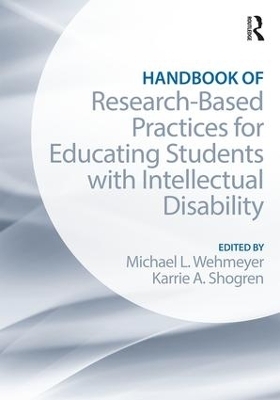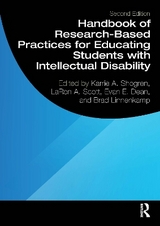
Handbook of Research-Based Practices for Educating Students with Intellectual Disability
Routledge (Verlag)
978-1-138-83210-7 (ISBN)
- Titel erscheint in neuer Auflage
- Artikel merken
The Handbook of Research-Based Practices for Educating Students with Intellectual Disability provides an integrated, transdisciplinary overview of research-based practices for teaching students with intellectual disability. This comprehensive volume emphasizes education across life stages, from early intervention in schools through the transition to adulthood, and highlights major educational and support needs of children and youth with intellectual disability. The implications of history, recent research, and existing information are positioned to systematically advance new practices and explore promising possibilities in the field. Driven by the collaboration of accomplished, nationally recognized professionals of varied approaches and philosophies, the book emphasizes practices that have been shown to be effective through multiple methodologies, so as to help readers select interventions based on the evidence of their effectiveness.
Michael L. Wehmeyer is the Ross and Mariana Beach Distinguished Professor of Special Education and Director and Senior Scientist at the Beach Center on Disability, University of Kansas, USA. He is a past president of the American Association on Intellectual and Developmental Disabilities and founding co-editor of the AAIDD journal Inclusion. Karrie A. Shogren is Professor of Special Education and Senior Scientist and Director of the Kansas University Center on Developmental Disabilities, University of Kansas, USA. She is founding co-editor of the AAIDD journal, Inclusion, and co-editor of the journal, Remedial and Special Education.
Section I: Understanding Intellectual Disability
Chapter 1 Historical Understandings of Intellectual Disability and the Emergence of Special Education
Michael L. Wehmeyer, J. David Smith
Chapter 2 Reframing Educational Supports for Students with Intellectual Disability Through Strengths-Based Approaches
Karrie A. Shogren, Michael L. Wehmeyer, Robert L. Schalock, James R. Thompson
Chapter 3 Supports and Support Needs in Strengths-Based Models of Intellectual Disability
James R. Thompson, Karrie A. Shogren, Michael L. Wehmeyer
Chapter 4 Implications of Strengths-Based Models of Disability for the Education of Students with Intellectual Disability
Michael L. Wehmeyer, Karrie A. Shogren
Section II: Eligibility, Assessment, and Educational Planning
Chapter 5 Measuring Intellectual Functioning and Adaptive Behavior in Determining Intellectual Disability
Marc J. Tassé, Margaret H. Mehling
Chapter 6 Measuring Support Needs and Supports Planning
James R. Thompson, Carolyn Hughes, Virginia Walker, Stephanie DeSpain
Chapter 7 Alternate Assessment
Meagan Karvonen, Shawnee Wakeman, Neal Kingston
Chapter 8 Individualized Education Programs to Promote Access to the General Education Curriculum for Students with Intellectual Disability
Michael L. Wehmeyer, Suk-Hyang Lee
Chapter 9 Planning for Other Educational Needs and Community-Based Instruction
David W. Test, Fred Spooner, Debra Holzberg, Colleen Robertson, Luann Ley Davis
Chapter 10 Transition Planning
James E. Martin, Amber E. McConnell
Chapter 11 Person-Centered and Student-Directed Planning
Karrie A. Shogren, Michael L. Wehmeyer, James R. Thompson
Section III: Schoolwide and Classroomwide Academic and Behavioral Supports
Chapter 12 Multi-Tiered Systems of Supports
Karrie A. Shogren, Michael L. Wehmeyer, Kathleen Lynne Lane, Carol Quirk
Chapter 13 Positive Behavior Supports for Students with Intellectual Disability
Glen Dunlap, Donald Jackson, Ashley Greenwald
Chapter 14 The Role of Technology in Implementing Universal Design for Learning
Loui Lord Nelson, Mindy Johnson
Chapter 15 Supporting the Social Lives of Students with Intellectual Disability
Elizabeth E. Biggs, Erik W. Carter
Chapter 16 Self-Determination and Goal Attainment
Karrie A. Shogren, Michael L. Wehmeyer
Chapter 17 Educating Students in Inclusive Classrooms
Jennifer Kurth, Susan Marks, Jody Bartz
Chapter 18 Research-based Practices for Fostering Trusting Partnerships with Families in Educating Students with Intellectual Disability
Kathleen Kyzar, Shana J. Haines, Ann P. Turnbull, Jean Ann Summers
Chapter 19 Teaching Reading and Literacy Skills to Students with Intellectual Disability
Susan R. Copeland, Elizabeth B. Keefe
Chapter 20 Teaching Mathematics and Science to Students with Intellectual Disability
Alicia Saunders, Diane Browder, Jenny Root
Section IV: Education across the Lifespan
Chapter 21 Early Intervention and Early Childhood Education
Michaelene M. Ostrosky, Rosa Milagros Santos, Hasan Y. Zaghlawan
Chapter 22 High Quality Educational Programs for Students with Intellectual Disability in Elementary School
Kendra Williams-Diehm, Susan B. Palmer
Chapter 23 High Quality Educational Programs for Students with Intellectual Disability in Middle and Junior High School
Colleen A. Thoma, Kimberly Wolowiec Fisher, Sarah Hall, LaRon A. Scott, Irina Cain, Andrew Wojcik, Brittany Sterret
Chapter 24 High Quality Educational Programs for Students with Intellectual Disability in High School
Mary E. Morningstar, Jennifer Kurth, Michael L. Wehmeyer, Karrie A. Shogren
Chapter 25 Transition to Employment
Paul Wehman, Lauren Avellone, Valerie Brooke, Pam Hinterlong, Katherine Inge, Stephanie Lau, Jennifer McDonough, Grant Revell, Carol Schall
Chapter 26 Postsecondary Education for Students with Intellectual Disability
Meg Grigal, Maria Paiewonsky, Debra Hart
About the Editors
About the Contributors
Index
| Erscheinungsdatum | 24.05.2016 |
|---|---|
| Zusatzinfo | 21 Tables, black and white; 27 Illustrations, black and white |
| Verlagsort | London |
| Sprache | englisch |
| Maße | 178 x 254 mm |
| Gewicht | 929 g |
| Themenwelt | Geisteswissenschaften ► Psychologie ► Pädagogische Psychologie |
| Medizin / Pharmazie ► Medizinische Fachgebiete ► Psychiatrie / Psychotherapie | |
| Sozialwissenschaften ► Pädagogik ► Sonder-, Heil- und Förderpädagogik | |
| ISBN-10 | 1-138-83210-3 / 1138832103 |
| ISBN-13 | 978-1-138-83210-7 / 9781138832107 |
| Zustand | Neuware |
| Informationen gemäß Produktsicherheitsverordnung (GPSR) | |
| Haben Sie eine Frage zum Produkt? |
aus dem Bereich



